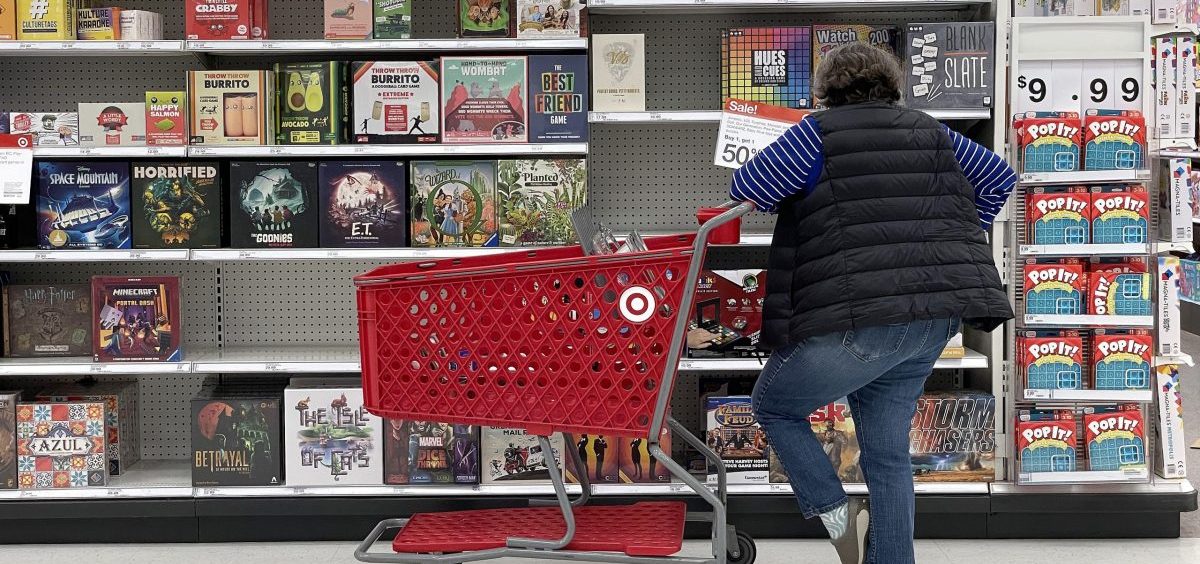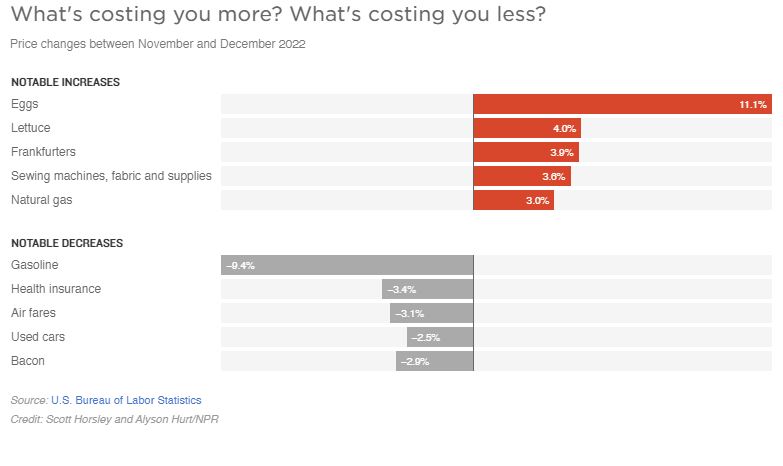News

Inflation is easing, even if it may not feel that way
By: Scott Horsley | NPR
Posted on:
WASHINGTON, D.C. (NPR) — Inflation eased last month, but prices are still climbing at a rapid rate, squeezing people’s pocketbooks and crimping their quality of life.
Lydia Simpson, a Tennessee resident, feels the sting of inflation every day.
“It feels like somebody’s got a can on a chain they keep pulling farther away from us, every time we get close to the prize,” she says.
Simpson got a new job last year and a sizeable pay increase, but the extra income was quickly erased by rising prices.
“The raise in pay was just in time for inflation,” Simpson says. “This massive raise that felt huge at the time, and then we were still just scraping by.”
Consumer prices in December were 6.5% higher than a year ago, according to the Labor Department. The annual inflation rate declined from 7.1% in November and a four-decade high of 9.1% in June.
The consumer price index actually fell 0.1% between November and December, largely thanks to falling gasoline prices. But the Federal Reserve still has a long way to go as it tries to restore price stability.
“We want to return the economy to a place where Americans — businesses, consumers, communities — they don’t have to think about inflation every day,” San Francisco Federal Reserve Bank president Mary Daly told the Wall Street Journal this week. “When I’m out there in the community, that’s the number one topic on people’s mind.
Adjusting to high inflation
Inflation is certainly on Simpson’s mind. Housing costs have been a top driver of inflation in recent months. And Simpson, who lives outside Nashville, wonders if she and her partner will ever be able to buy a home.
“Looking at the housing market around here — how little of the sort of middle-of-the-road housing is available — and as first-time homebuyers, it makes access to the market a little bit tricky,” Simpson says.
Rising mortgage rates have made homebuying even more expensive. The average rate on a 30-year fixed-rate loan is about 6.5% — more than double what it was last year.
In an effort to save money, Simpson and her partner have cut out food deliveries, “which is a bummer,” she says. “We’re restaurant people.”
They have taken side gigs, however, delivering food to others, in order to earn extra cash.
“It has definitely been helpful,” Simpson says. “On days when it’s almost payday and bank account is running low, just to be able to know that I can go out and do a few dashes and make just enough to be able to put food on the table for dinner that night.”
Inflation still stings in the supermarket aisle
Putting food on the table is increasingly costly, with grocery prices up 11.8% in the last year.
Ariane Navarro says her supermarket bills have ballooned since the beginning of the pandemic.
“We’ve always had a budget, an excel spreadsheet, where we put how much we spend on groceries — how much we spend on different categories,” the Houston resident says. “We saw that we’re buying the same amount of groceries. But it’s gone up like 50%.”
She and her husband quickly burned through the savings they had piled up early in the pandemic, when travel and entertainment were largely off limits and the federal government was making generous relief payments.
“We were able to save up $10,000, which we were really happy about,” Navarro recalls. “But everything became more expensive. So yeah, that was gone.”
Inflation could stay high for a while
The prices of some goods have begun to fall. New car prices, for example, declined in December for the first time in nearly two years. But Fed officials are concerned that the rising price of services — which includes everything from haircuts to house painting — could keep inflation stubbornly high.
Service costs are largely driven by the wages of service workers such as barbers and plumbers.
Earlier this month, the Labor Department reported that annual wage gains in December were somewhat smaller than the month before: 4.6% compared to 4.8% in November.
Daly told the Wall Street Journal that’s encouraging, but not enough to declare “mission accomplished.”
“I don’t think we should declare victory on inflation, on the labor market, on any of the things that we’re seeing, based on one month of data,” she says.
The central bank is expected to raise interest rates again in early February, and keep rates elevated until it’s clear that inflation is under control.
“If you declare victory early and stop, you could find yourself with a much worse situation down the road,” Daly says.
9(MDU1ODUxOTA3MDE2MDQwNjY2NjEyM2Q3ZA000))



